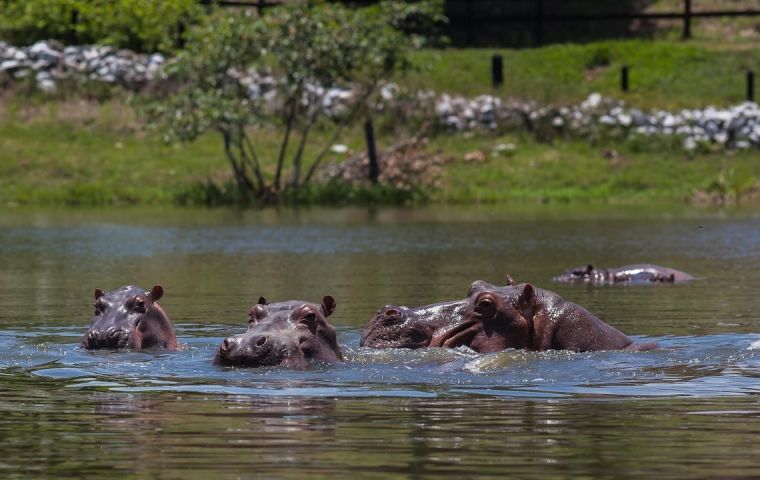MercoPress. South Atlantic News Agency
Pablo Escobar's original four hippos in Colombia, could number 1,400 by 2034
 The situation began in the 1980s when Pablo Escobar established a private zoo in Puerto Triunfo, a town along the river
The situation began in the 1980s when Pablo Escobar established a private zoo in Puerto Triunfo, a town along the river Hippopotamuses are increasing in Colombia despite being an alien species in South America. Their existence in the country began with the import of four individuals by drug lord Pablo Escobar. The four hippopotamuses later escaped into the wild.
In January, biologists and other experts who fear the animals may adversely affect the ecosystem pointed out the need to cull the animals in an academic report, but there have been controversies around the issue.
Hippopotamuses are native to Sub-Saharan Africa. But according to the report carried in academic journal Biological Conservation, which was written by biologists mainly based in Colombia, about 80 hippopotamuses currently reside in the Magdalena River, which flows through the northwest of the country.
The situation began in the 1980s when Pablo Escobar established a private zoo in Puerto Triunfo, a town along the river. Escobar was the leader of the Medellin Cartel, which was said to be the world’s largest narcotics syndicate.
In those days, Escobar had such enormous financial power that he appeared on a list of the world’s billionaires put out by U.S. economic magazine Forbes.
At the zoo, Escobar kept animals that had been illegally imported. Among the animals, there were four hippopotamuses – one male and three females – that had been brought over from U.S. zoos.
Escobar was shot to death in Colombia by security troops in December 1993. The Colombian authorities confiscated his weapons and assets, and transferred the animals to other zoos.
But the four hippopotamuses were left unattended partly because transportation costs were high. As they have no natural enemies among other animals in the area, the freed mammals increased in number.
According to the academic report, the hippopotamus population will increase to about 1,400 by around 2034.
The biologists warn that the animals will endanger native species, such as the manatee, and that a predicted change in water quality will affect local fisheries.




Top Comments
Disclaimer & comment rulesCommenting for this story is now closed.
If you have a Facebook account, become a fan and comment on our Facebook Page!